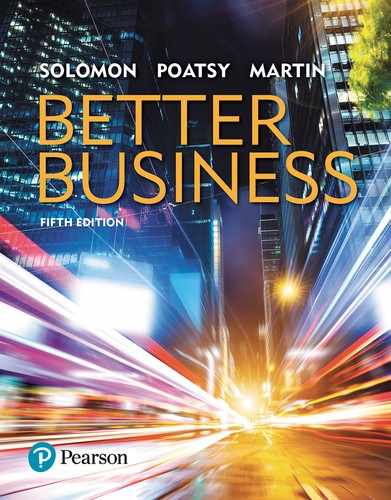Objective 2-3 Degrees of Competition
-
Describe the various degrees of business competition.
Monopolies
What is a monopoly? A monopoly occurs when a provider of a service or a good has control of all or nearly all of its market. If one company were the sole provider of automobile tires and no other tire manufacturers were available to the automobile industry, that would be considered a monopoly. Monopolies can also happen in a local or a regional market. For example, if Eddie’s coffee kiosk is the only place students can buy coffee on campus, then Eddie has a monopoly on campus coffee sales. In the United States, as well as in other countries, large monopolies are rarely allowed.
Why aren’t there many monopolies? Without competition, a firm that has a monopoly can charge a higher price and may be less responsive to consumer needs. Monopolies can occur when companies that offer the same service or provide the same good merge and thus control the market. The U.S. Federal Trade Commission and the Department of Justice must review mergers between large competitors to determine whether the combined firm would result in a monopoly that would thwart competition. For example, in 2011, the Department of Justice blocked the proposed merger between AT&T and T-Mobile on the grounds that the deal was anticompetitive. When US Airways and American Airlines merged, the Department of Justice required the companies to sell the gates they own in certain airports to other airlines to enhance competition in the airline industry after the merger.3
In the United States, natural monopolies are an exception. Utility companies, such as those that sell natural gas or water to consumers, may be permitted to hold monopolies in an effort to conserve natural resources. However, the government regulates the prices for these goods and services, thus preventing the utility companies from overcharging for their products.
Duopolies and Oligopolies
What happens when one or two other companies enter a monopolistic market? To answer this question, let’s look again at Eddie and his coffee kiosk from the previous section. At first, Eddie’s coffee kiosk was the only place on campus to buy coffee; Eddie had a monopoly. But after the bookstore on campus opened a café and started to sell coffee, students now had a choice to buy coffee at two places—either at the bookstore or at Eddie’s coffee kiosk. The situation changed from a monopoly to a duopoly. A true duopoly is where only two suppliers exist, although in reality the definition is generally used to describe situations where only two firms dominate a market. Examples of duopolies include PepsiCo and Coca-Cola in the soft-drink market and Intel and AMD in the computer processor market.
However, if the campus cafeteria also begins to sell coffee, then an oligopoly is created. An oligopoly is a form of competition in which only a few sellers exist, each with a fairly large share of the market. For example, the cellular phone market in the United States is controlled by an oligopoly of four companies: Verizon, AT&T, Sprint, and T-Mobile. Typically, oligopolies (and duopolies) occur in industries in which a high investment of capital must be made to enter the market.

Verizon, AT&T, Sprint, and T-Mobile together control the majority of the U.S. cellular phone market, forming an oligopoly.
Source: Carr/MCT/Newscom
Because there is little differentiation between products, competition is strong in a duopoly and an oligopoly, and prices differ only slightly, if at all, between the few suppliers. If one company cuts prices, its action is usually matched quickly by the competition. Therefore, firms that compete as duopolies and oligopolies more often compete by differentiating their products from one another (making one product stand out from another) rather than competing on prices.
Monopolistic Competition
What happens when there isn’t much differentiation between products? Let’s assume that the coffee the cafeteria begins to offer is perceived among students to be superior to Eddie’s and the bookstore’s coffee. The added choice of a perceived superior product creates monopolistic competition. Monopolistic competition occurs when there are many buyers and sellers and the products are similar but not identical (coffee versus coffee). Often there is a perceived difference among consumers who thereby favor one product offering over another so that the products are not perfectly substitutable products.
Monopolistic competition is everywhere. Think of the traditional strip mall or local shopping center in your neighborhood where most likely there is a pizza parlor, a dry cleaner, a hair or nail salon, and a dollar store. These mom-and-pop stores are traditional, monopolistic competitive businesses because there are many buyers and sellers and the products are similar but not identical. Often, the real distinction between these products is price.
Perfect Competition
What happens when products are almost identical? Perfect competition occurs when there are many buyers and sellers of products that are virtually identical and any seller can easily enter and exit the market. When these conditions exist, no single supplier can influence the price. In reality, there are few, if any, examples of perfect competition. However, agricultural products, such as grains, fruits, and vegetables, come close. Many of these products appear to be identical, and, because there are many sellers in the market, no single seller can set the prices for these products.
Competition encourages businesses to make creative decisions and gives customers options. Because of this need for competition, U.S. businesses face stiff penalties if they are found holding illegal monopolies. By keeping a close watch on monopolies, the U.S. government tries to ensure that no single seller drastically influences the price of a certain service or good.
